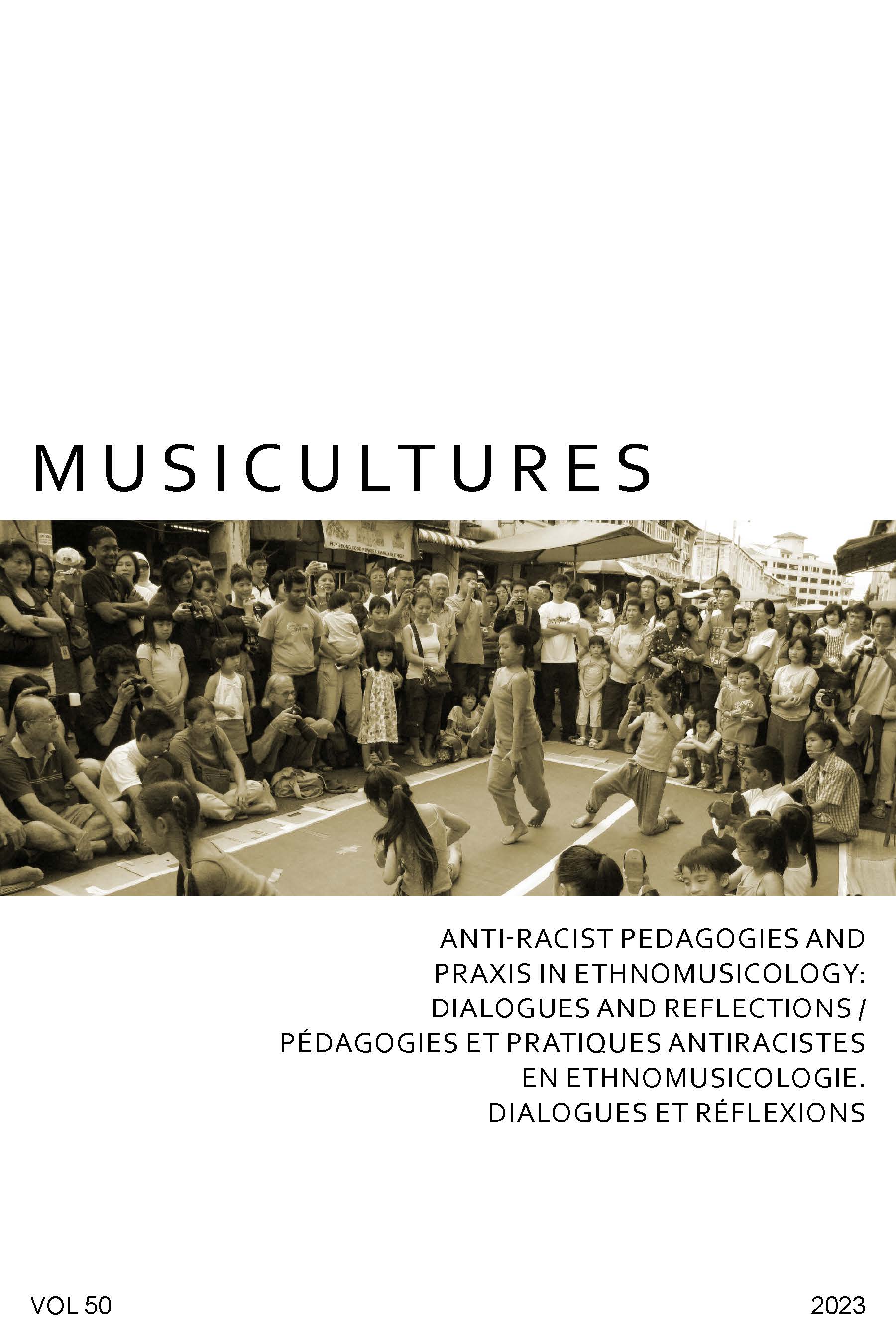Abstract
Music of Sound (MOS) pedagogy promotes the learning of musical concepts and creative expression using everyday objects, body parts, and one’s voice. The authors discuss the experiential, collaborative, and place-based approaches they have developed in MOS projects for schoolchildren of different ethnic, religious, and social backgrounds in Malaysia over the last two decades. Ensemble work in skill training, field research, and collective composition resulting in site-specific workshop performances enhances interethnic cohesion among children. Tertiary students who are involved in facilitation experience multiple kinds of musical knowledge and the potential of collaborating with multiethnic communities of practice.
References
Bartleet, Brydie-Leigh, and Lee Higgins, eds. 2018. The Oxford Handbook of Community Music. New York: Oxford University Press.
Boal, Augusto. 1993. Theatre of the Oppressed. New York: Theatre Communications Group.
[Clifford, Miriam] TeachThought Staff. 2020. What are the Best Collaborative Learing Tips and Strategies for Teachers? TeachThought. February 2. https://www.teachthought.com/pedagogy/collaborative-learning-tips/.
Campbell, Patricia Shehan. 2018. Music, Education, and Diversity: Bridging Cultures and Communities. New York, NY: Teachers College Press.
Gardner, Howard. 2000. The Disciplined Mind: Beyond Standardized Tests, the K-12 Education that Every Child Deserves. New York: Penguin Group.
Gardner, Howard. 2004. Frames of Mind: The Theory of Multiple Intelligences. 2nd ed. New York: Basic Books.
Gardner, Howard. 2006. Multiple Intelligences: New Horizons. 2nd ed. New York: Basic Books.
Freire, Paulo. 2000. Pedagogy of the Oppressed. New York: Continuum.
Higgins, Lee, and Brydie-Leigh Bartleet. 2012. The Community Music Facilitator and School Music Education. In vol. 1 of The Oxford Handbook of Music Education, 495–511. Ed. Gary E. McPherson and Graham F. Welch. New York: Oxford University Press.
Kementerian Pendidikan Malaysia. 2013. Malaysia Education Blueprint 2013-2025. https://www.moe.gov.my/index.php/en/dasarmenu/pelan-pembangunanpendidikan-2013-2025.
Matusky, Patricia, and Tan Sooi Beng. 2017. The Music of Malaysia: The Classical, Folk and Syncretic Traditions. London: Routledge.
Pillai, Janet. 2006. Socially Engaged Arts in Asia Today. Arts and Society, no. 3. https://alfpnetwork.jfac.jp/en/e-magazine003_01/.
Sternberg, Robert. J., and Li-fang Zhang, eds. 2000. Perspectives on Cognitive, Learning, and Thinking Styles. Mahwah, NJ: Lawrence Erlbaum Associates, Inc.
Tan Sooi Beng. 2008. Activism in Southeast Asian Ethnomusicology: Empowering Youths to Revitalize Traditions and Bridge Cultural Barriers. Musicological Journal 44 (1): 69–83.
Tan Sooi Beng. 2018. Community Musical Theatre and Interethnic Peace-Building in Malaysia. In The Oxford Handbook of Community Music, 243–64. Ed. Brydie-Leigh Bartleet and Lee Higgins. New York: Oxford University Press.
Tan Sooi Beng. 2019. Bridging the Racial Divide in Malaysia: Crossing Borders through Research and Process Theatre. In Ethnomusicology Matters, Influencing Social and Political Realities, 93–116. Ed. Ursula Hemetek, Marko Kolbi and Hande Saglam. Vienna: Bohlau Verlag. https://library.oapen.org/bitstream/id/5279713-c8c8-440b-9261-7a226b947ab0/external_content.pdf.
Toh Lai Chee. 2012. Pengajaran dan Pembelajaran Muzik Kolektif Melalui Teori Kecerdasan Pelbagai untuk Memperkembangkan Kecerdasan Muzikal dan Mengaktifkan Kecerdasan Lain [Teaching and learning music collectively to develop musical intelligence and activate other intelligences]. Malaysian Music Journal 1 (1): 58–74.
Toh Lai Chee. 2015. Strategies and Approaches in the Teaching and Learning of Boria in the Institute of Teacher Education and Schools in Penang. Malaysian International Journal of Research in Teacher Education 1:60–72.
Toh Lai Chee. Music of Sound: Empowering Children to Learn English and Science the Meaningful Way through Creative Expression and Higher Order Thinking from Multiple Pathways. Jurnal Penyelidikan Ilmu Pendidikan Institut Pendidikan Guru Malaysia 4:10–27.
Van Erven, Eugene. 1992. The Playful Revolution, Theatre and Liberation in Asia. Bloomington: Indiana University Press.
- The author retains copyright over the work.
- The author grants the journal owner (The Canadian Society for Traditional Music / La Société canadienne pour les traditions musicales) an exclusive license to publish the work.
- The author may post a pre-print or post-print version of the work (see definitions below) on a personal website for up to twelve months after the work is published in MUSICultures. After twelve months, the pre-print version must be replaced with the published version.
- The author may deposit the published PDF of the work in a non-commercial online repository twelve months after the work is published in MUSICultures, or any time thereafter.
- Any such deposit must include a link to the work on the MUSICultures website, e.g., https://journals.lib.unb.ca/index.php/MC/article/view/19996
A pre-print is a work-in-progress—a contribution not yet accepted, or perhaps even submitted, to MUSICultures.
A post-print is the version of a contribution after peer review and acceptance by MUSICultures, with revisions completed.
The published version is the PDF file of a contribution as it appears in MUSICultures.
Please note that academia.edu and ResearchGate.com are both for-profit repositories; authors may not deposit the published PDF of the work in these repositories until after the journal’s embargo period.
For permission to reprint or translate material from MUSICultures, please contact Heather Sparling, General Editor of MUSICultures (heather_sparling@cbu.ca).

